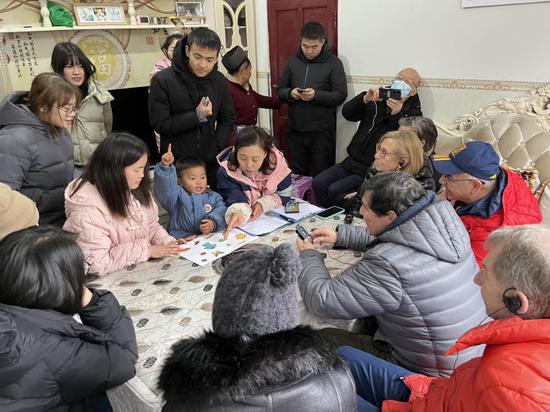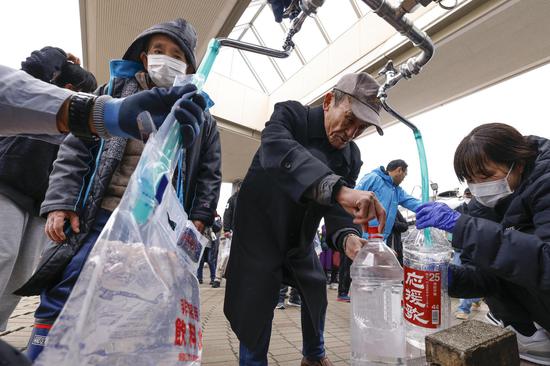
Local children attend parent-child group activities at the Dayin Town Early Child Development Center in Bijie, Guizhou Province, on December 18, 2023 International experts in early childhood education observe a parenting coach at the home of 3-year-old Li Quan in Shiying Village of Dayin Town in Bijie on December 18, 2023 (TAO XING)
Li Quan, a 3-year-old boy, lives in Shiying Village of Dayin Town in Bijie, southwest China's Guizhou Province. Every week Li's home welcomes a special guest—a parenting coach, who encourages and guides his mother or grandmother to play, talk, read and sing with him.
On the afternoon of December 18, 2023, the silence in the small living room of Li's home would occasionally be broken by a burst of laughter, lending the cold winter a warm touch. The laughter erupted whenever Li would successfully complete a puzzle or actively react to his mother or the coach.
The coach's home visit is an "active involvement" method of the China Rural Education and Child Health (China REACH) program, which provides rural families with children aged 6 to 36 months with one-hour in-home parenting guidance once a week.
China REACH was first launched in 2015 in Huachi County of Gansu Province in northwest China, by the China Development Research Foundation (CDRF), a think tank that conducts research and analysis on China's developmental issues, in cooperation with the National Health Commission, the country's highest healthcare authority, and local governments.
The time between birth and age 3 is a period of rapid brain development when billions of connections between individual neurons are established.
Promoting the early development of rural infants and toddlers will promote the structural and functional development of children's brains, laying a good foundation for later learning, social interaction, psychological development and social adjustment, the CDRF believes.
According to the CDRF, as of November 2023, the program had covered 19 counties in 10 provinces and regions, benefiting about 37,000 children—with around 8,000 of them in Bijie.
On December 18, 2023, a group of experts in early childhood education from the United States, Mexico, Brazil, Chile, South Africa and the UNICEF traveled to Bijie to explore local efforts promoting children's optimal development. They also visited Li's home, a 1.5-hour drive from the city center, to observe the parenting coach's visit.
Taking the long view
Li joined the program when he was just 6 months old. Previously, he lived with his 62-year-old grandmother as his father and mother were working in places far away from their hometown.
This is a common scenario in rural China. As their parents often have to leave the rural setting they call home to find work in urban areas, many children are left behind and raised by rapidly aging grandparents.
Under the program, the parenting coaches usually are local (village) women aged 25 to 35 who have at least completed their junior high school education and received related training before getting involved with their designated families. One coach works with 15 to 20 children.
During home visits, coaches work with children and their caregivers to complete several activities, including games, drawing, reading, singing, etc., following the flow of activities outlined in the teaching materials. The home visits cost an average of 3,000 yuan ($450) per child per year, including the coach's salary, teaching materials and other expenses. This fee is jointly funded by donations and local government budgets, according to the CDRF.
"Through home-based early parenting guidance, caregivers can learn how to guide their children and improve their children's language skills, social development abilities and emotional skills," said Guo Qiong, a parenting coach, at a work exchange meeting between the experts, coaches and local officials on the evening of December 18, 2023. Guo used to be a homemaker.
"I once met a child who lived with his 80-year-old great-grandmother and had severe speech problems. The great-grandmother had previously assumed he would grow out of it, but that did not happen, and the problem in turn negatively affected the child's psychological development," Guo said. The program helped her understand the importance of the active involvement of parenting coaches.
They also record the progress of these children and upload related data to an application for further analysis, another coach said.
"Analyzing data is important because it contributes to the process of planning, implementation; better quality needs a process of continuous improvement," commented Bernardo Aguilar Montiel, Director of Quality and Innovation at Mexico's Infant Development Centers of Frente Popular Tierra y Libertad (CENDI), at the work exchange meeting.


















































 京公网安备 11010202009201号
京公网安备 11010202009201号